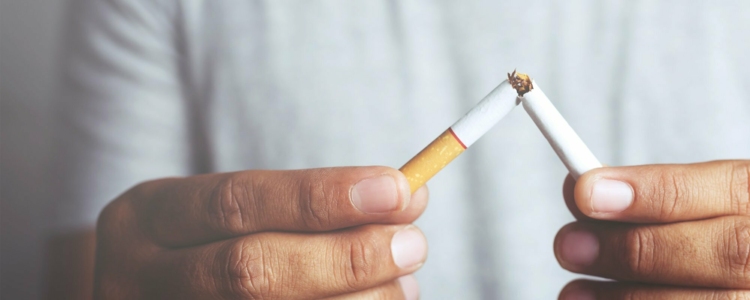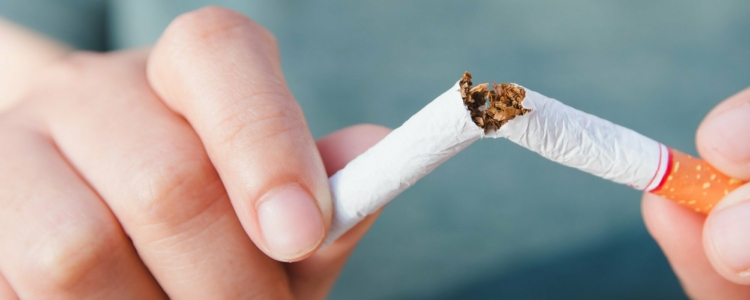Cough and cold-like symptoms
When you stop smoking, it is very likely that you will have coughing fits for a few weeks. Don’t worry, this is a good sign! Your lungs are cleaning themselves out by eliminating any trace of nicotine or cigarette smoke in your airways. Given that nicotine has an anesthetic effect on the cough nerve, smokers lose their cough reflex. When the body no longer receives any nicotine, the cough system returns to normal so the lungs are once again able to clean themselves out. So the cough is a good thing, don’t you think?
How to get rid of it?
Let nature run her course. Doing physical activity, eating healthy food and drinking lots of water can help.
Weight gain
One of the things you hear very often then it comes to quitting smoking is that it can lead to weight gain. Why? First of all, is it important to note that smoking affects your appetite by reducing your senses of smell and taste, which make smokers less interested in food. So when these senses return, smokers can start eating more. Knowing this, it is entirely possible to control your intake of calories even when you quit smoking.
Smoking is also known to be an appetite suppressant, as well as an artificial metabolic booster, which could mean that smokers are slightly below their normal weight. However, when your body is functionally normally again, it will be easier to remain fit and healthy. You just need to take care of yourself!
Maintaining a healthy weight when you stop smoking. Each day, make sure to:
- Be as active as you can (the more active you are, the more you’ll want to be);
- eat a variety of quality foods;
- drink water regularly.
Insomnia
It is possible that people who are trying to quit smoking experience some difficulty sleeping or even have strange dreams. Nicotine directly effects the nervous system, which disturbs the sleep cycle. When you stop smoking, the nervous system needs an adjustment period to return to normal, which is what causes the perturbation.
These symptoms may last a few weeks. It is recommended to take some simple steps to maximize the quality of your sleep (e.g., sleep in a dark room, lower the temperature of the room, try not to eat rich meals in the evening, etc.). As well, avoid taking stimulants (coffee, Coke, Pepsi) before going to bed. Take a walk outside after dinner, take a bath, and try to relax before you go to bed!
There’s more? Yes, in fact, ex-smokers say that they sleep more deeply after quitting. What are you waiting for to enjoy a better quality of life?
Irritability and mood swings
When you quit smoking, you stop receiving your usual dose of nicotine, which suddenly plunges your brain into withdrawal. It will send you false signals and can make you experience various emotions, such as sadness, impatience and even anger. It is important to understand that cigarettes are, for many, a way to manage stress, which means smokers may be unprepared to handle their emotions without a cigarette.
Knowing this, it is recommended to do as much as you can to take care of yourself. As your loved ones will need to be patient, tell them that this behaviour is caused by a lack of nicotine and is only temporary and that it should improve in a few weeks at most. Make time to be active, or to meditate, be calm and rest. This will help you get through the mood swings. There are also other solutions to counteract these symptoms and ensure that you remain in a good mood, just ask for pharmacist for more information.
Nicotine cravings
When you stop smoking, you may crave cigarettes. Often these craving translate into thoughts such as: smoking just one cigarette won’t do me any harm, or having a cigarette is the only thing that will make me feel better. These thoughts can pop up a few times during the first weeks and will disappear quickly. Remember, your brain is trying to convince you to give it nicotine, and it will continue to do so as long as you keep giving it some!
Remember! Preparation is the key to success!
Here are a few ways to prepare yourself to quit:
- Make a list of what triggers you, depending on your smoking habits.
- Avoid, as much as possible, triggers in the first weeks.
- Prepare an action plan to follow when you are dealing with cravings.
- Be mentally ready to face the challenges that may arise.
- Try to change your routine to avoid what makes you smoke.
In the end, quitting is first and foremost a positive choice for your health and well-being. As well as giving you full control over your life, you can enjoy a better quality of life and improved health. Avoid all the risks associated with smoking by freeing yourself of it once and for all!
This information is not a substitute for professional medical advice and Accès pharma affiliated pharmacist-owners cannot be held responsible for this information. The information was true and accurate at the time of publication, but it is subject to change.





